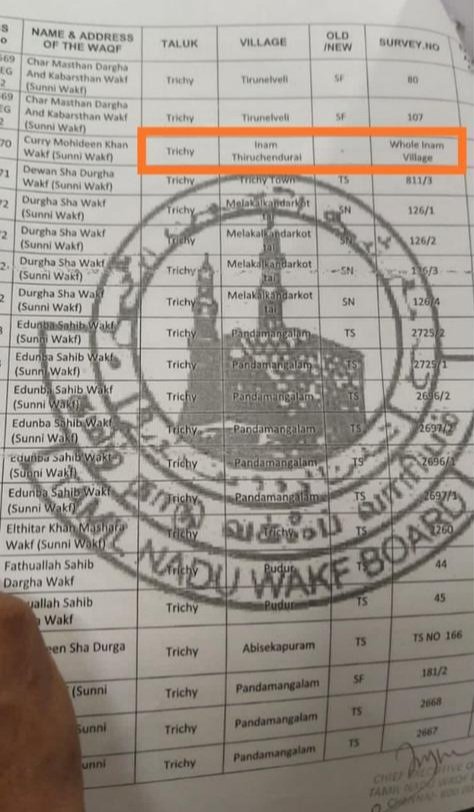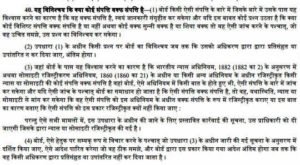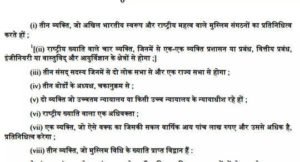The land under Waqf Board has more than doubled in just 13 years!


Highlights
These days the Waqf Board is in a lot of discussion. The Anti Corruption Branch (ACB) of the Delhi government has arrested Aam Aadmi Party (AAP) MLA Amanatullah Khan from Okhla in connection with the scam related to the Waqf Board. On the other hand, about 90 percent of the land of a Hindu-dominated village in Tamil Nadu has been declared as Waqf property, which also has a 1500-year-old temple. Imagine, Waqf has claimed its ownership even on the temple before the arrival of Islam in the world! Terming such controversial activities of the Waqf Board and the privileges given to it as unconstitutional, senior advocate Ashwini Upadhyay has approached the court. In such a situation, it is necessary to know what the Waqf Board is, what it does and what powers it has. So, from the formation of Waqf Board to their activities, let’s talk in detail on one point each…
Waqf Board land has more than doubled in just 13 years!
First of all, know that Waqf Board has the highest land after Indian Army and Railways. That is, the Waqf Board is the third largest land owner in the country. According to the Waqf Management System of India, all the Waqf Boards in the country have a total of 8 lakh 54 thousand 509 properties spread over more than 8 lakh acres of land. The army has properties on about 18 lakh acres of land, while the railways have movable and immovable properties spread over about 12 lakh acres. Now those who are going to know the figure, they will be shocked. In the year 2009, the properties of the Waqf Board were spread over 4 lakh acres of land. It is clear that the properties of the Waqf Board have more than doubled in the last 13 years. You also know that the land does not expand. Then why is such a huge part of the land, which is part of the Waqf Board, going away so fast?
How is the area of Waqf Board land increasing?
In fact, wherever the Waqf Board encircles the graveyard across the country, the land around it also declares it as its property. Illegal shrines, new mosques are also getting flooded. These shrines and the surrounding lands are occupied by the Waqf Board. Since the Waqf Act of 1995 states that if the Waqf Board feels that any land is the property of the Waqf, then it is not his responsibility to prove it but the real owner of the land to show how his land does not belong to the Waqf. The 1995 law definitely says that the Waqf Board cannot claim any private property, but how will it decide that the property is private? The answer has been given above. If the Waqf Board only believes that any property belongs to the Waqf, then it does not have to produce any document or evidence, All the papers and proofs have to be given to him who has been the claimant till now. Who does not know that many families do not have a solid land paper. The Waqf Board takes advantage of this as it does not have to provide any paper for taking possession.
Know the story of the formation of the Waqf Board
Senior journalist Pradeep Singh explains that with the independence of India from British rule in 1947, Pakistan became a new country after the partition of India. Then the lands of the Muslims who migrated from India to Pakistan were declared as Waqf property. He says that in the Nehru-Liaquat Pact of 1950, it was decided that the displaced people would continue to have rights over their properties in India and Pakistan. They can sell their properties. However, the same fate happened to other provisions of the Nehru-Liaquat Pact in Pakistan.
He further says that the lands left by Hindus in Pakistan, their houses and other properties were occupied by the government or local people there. But the then Prime Minister of India Jawaharlal Nehru said that no one will touch the properties of Muslims who have gone to Pakistan from here. The properties which were left after they were sold and taken away by the owners were declared as Waqf property. Enemy property was the exception, it was the right of the government. Pradeep Singh says, ‘Waqf Board was formed in 1954. This is where the agenda of Islamization of India started. He said, ‘There is no organization named Waqf Board in any Islamic country of the world. This is only in India, which is a secular country, not an Islamic one.
Waqf Board got unlimited powers by 1995 amendment
In the year 1995, the Congress government of PV Narasimha Rao amended the Waqf Act 1954 and gave unlimited powers to the Waqf Board by adding new provisions. Pradeep Singh states that according to Section 3(R) of the Waqf Act 1995, any property, for any purpose considered to be pak (holy), religious (religious) or charitable (charitable) according to Muslim law, shall be deemed to belong to the waqf. The property will be They say that Article 40 of the Waqf Act 1995 says who owns this land, it will be decided by the Surveyor and Waqf Board of Waqf. Actually, there is a surveyor of the Waqf Board. He decides which property belongs to Waqf and which does not. There are three grounds for this determination – if someone has transferred his property in the name of Waqf, if a Muslim or Muslim organization has been using the land for a long time or if the survey proves the land to be the property of the Waqf.
The big thing is that if your property is declared as Waqf property, then you cannot go to court against it. You will have to approach the Waqf Board itself. Waqf Board’s decision came against you, even then you cannot go to court. Then you can approach the Waqf Tribunal. This tribunal consists of administrative officers. There may also be non-Muslims in it. However, depending on which party the state government belongs to, who will be in the tribunal. It is possible that everyone in the tribunal may also be Muslim. Anyway, it is often the effort of the governments that the tribunal should be formed with as many Muslims as possible. Section 85 of the Waqf Act states that the decision of the Tribunal cannot be challenged in the High Court or even in the Supreme Court.

One Central, 32 State Waqf Boards in the country
There is one Central Waqf Board and 32 State Boards in the country. The Union Minister for Minority Welfare is the ex-officio Chairman of the Central Waqf Board. Needless to say that only a Muslim is made the Minister of Minority Welfare. Mukhtar Abbas Naqvi was in this post in the Modi government. Smriti Irani has been the Minority Welfare Minister since her removal. He belongs to the Parsi minority community. Thus the chairman of the Central Waqf Board may be a non-Muslim at times, but all the members are Muslim. This is enshrined in the law. As far as the State Waqf Boards are concerned, all its seven members are also Muslims. Senior advocate and BJP leader Ashwini Upadhyay explains, “The Waqf Board consists of a lawyer, an MLA, an MP, a town planner, an IS officer, a scholar, a mutawalli. The Waqf Act says that all of them will be Muslims. Upadhyay says, If the board says on any land that this land belongs to Waqf, then against its notice, not the court, but the Waqf Tribunal will have to appeal. Imagine, the Waqf Board which has made a false claim, will also hear the complaint against the same Extended Institution. He asks that if someone feels that the tribunal cannot be doubted, then why is there no similar law, similar tribunal for non-Muslims?

Waqf board is a tool for extortion and forced conversion?
Upadhyay explains that there is no limit on which land the Waqf Board will issue notices. Wherever he wants, he should declare that land as the property of Waqf and he who has land, he has to face unnecessary trouble. They allege that Waqf is taking advantage of this and making recovery. The person from whom he has to collect, threatens him that his land will be declared as Waqf property. Out of fear, that person starts worshiping the Waqf officials and then is forced to accept arbitrary conditions. Upadhyay alleges that the Waqf Board is getting the poor converted by the misuse of its unlimited powers. He gives notices on people’s land in tribal areas and when a person is upset he is told that if he converts to Islam, the land will be saved. They claim that in the backward areas of states like Chhattisgarh, Jharkhand, Maharashtra where people are not educated enough, the Waqf Act has become a tool of conversion.
The land of Hindu majority village in Tamil Nadu became the property of Waqf!
Take the latest case of Tamil Nadu. Tiruchenthurai, a Hindu majority village in Trichy district of the state, has been declared its ownership by the Waqf Board. The board said that the entire land of this village belongs to Waqf, whereas there are only 22 Muslim families in that village while the Hindu population is 95 percent. Surprisingly, the property of Waqf has also been declared on the temple there. Villagers say that this temple is 15 hundred years old, that is, before the arrival of Islam in the world. This case of Tamil Nadu is a shining example of the unlimited powers and misuse of the Waqf Board.
Government grant to Waqf Board
In the Modi government also, generosity was shown regarding Waqf. The Central Waqf Board made a rule that if schools, hospitals etc. are built on the Waqf land, then the entire expenditure will be of the government. This happened when Mukhtar Abbas was Naqvi’s Minority Welfare Minister. On the one hand the government takes money from the temples, on the other hand it gives grants to the waqfs. The government creates the temple trust, for that there is a provision to include non-Hindus also in the trust. Not only this, non-Hindus are also allowed to open shops in the temple premises. Journalist Pradeep Singh says, ‘The process of Islamization of India started only after the partition of India. The country was divided in the name of religion, Pakistan was made in the name of religion. The Muslims living in this country said that they could not live with the Hindus, so Pakistan became a separate country. It is a historical fact that those who demanded a separate country by running the agenda of a Muslim country, Most of them remained in India. Ashwini Upadhyay has approached the court regarding these objections. He has filed a petition in the Delhi High Court. However, now he has appealed to the High Court to send the petition to the Supreme Court.
DISCLAIMER: The author is solely responsible for the views expressed in this article. The author carries the responsibility for citing and/or licensing of images utilized within the text.
